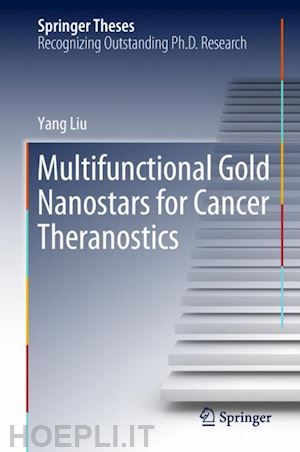
Questo prodotto usufruisce delle SPEDIZIONI GRATIS
selezionando l'opzione Corriere Veloce in fase di ordine.
Pagabile anche con Carta della cultura giovani e del merito, 18App Bonus Cultura e Carta del Docente
This thesis presents the development of theranostic gold nanostars (GNS) for multimodality cancer imaging and therapy. Furthermore, it demonstrates that a novel two-pronged treatment, combining immune-checkpoint inhibition and GNS-mediated photothermal nanotherapy, can not only eradicate primary treated tumors but also trigger immune responses to treat distant untreated tumors in a mouse animal model.
Cancer has become a significant threat to human health with more than eight million deaths each year, and novel methods for cancer management to improve patients’ overall survival are urgently needed. The developed multifunctional GNS nanoprobe with tip-enhanced plasmonics in the near-infrared region can be combined with (1) surface-enhanced Raman spectroscopy (SERS), (2) two-photon photoluminescence (TPL), (3) X-ray computed tomography (CT), (4) magnetic resonance imaging (MRI), (5) positron emission tomography (PET), and (6) photothermal therapy (PTT) for cancer imaging and treatment. The ability of the GNS nanoprobe to detect submillimeter intracranial brain tumors was demonstrated using PET scan – a superior non-invasive imaging modality – in a mouse animal model. In addition, delayed rechallenge with repeated cancer cell injection in cured mice did not lead to new tumor formation, indicating generation of a memorized immune response to cancer.The biocompatible gold nanostars with superior capabilities for cancer imaging and treatment have great potential for translational medicine applications.
Yang Liu obtained his bachelor’s (2007) and master’s degrees (2010) in Chemistry from Shanghai Jiao Tong University, China, where he studied molecular simulation in Dr. Huai Sun’s lab between 2005 and 2010. After coming to Duke University, USA in 2010, he developed a multifunctional gold nanoprobe for sensitive cancer imaging and phototherapy. He has won several awards including a “Kathleen Zielek” fellowship and “Student Travel Award” to the SPIE conference. He received his master’s degree in Biomedical Engineering in 2014 and Ph.D. degree in Chemistry in 2016 from Duke University. He is currently continuing his work on nanomedicine for cancer imaging and photoimmunotherpay as a postdoctoral research associate mentored by Dr. Tuan Vo-Dinh.











Il sito utilizza cookie ed altri strumenti di tracciamento che raccolgono informazioni dal dispositivo dell’utente. Oltre ai cookie tecnici ed analitici aggregati, strettamente necessari per il funzionamento di questo sito web, previo consenso dell’utente possono essere installati cookie di profilazione e marketing e cookie dei social media. Cliccando su “Accetto tutti i cookie” saranno attivate tutte le categorie di cookie. Per accettare solo deterninate categorie di cookie, cliccare invece su “Impostazioni cookie”. Chiudendo il banner o continuando a navigare saranno installati solo cookie tecnici. Per maggiori dettagli, consultare la Cookie Policy.